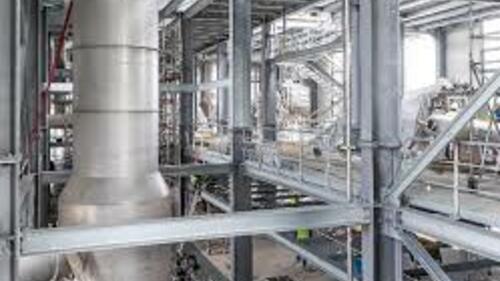AMG Hosts Successful Opening of Europe’s First Lithium Hydroxide Refinery in Bitterfeld-Wolfen
Amsterdam — AMG Critical Materials N.V. (“AMG”, EURONEXT AMSTERDAM: “AMG”) hosted the opening of its lithium hydroxide refinery in Bitterfeld-Wolfen, Saxony-Anhalt in Germany earlier today. AMG Lithium B.V., which houses all of AMG’s lithium activities, has commissioned production of battery-grade lithium hydroxide at the first of its five modules planned for the site.
Annual capacity of one module is 20,000 tons per year – enough for the batteries of around 500,000 electric vehicles (“EVs”). AMG’s first module is sold out and by 2030, AMG’s concept is to expand annual production up to 100,000 metric tons of battery-grade lithium hydroxide depending on market conditions. The recent Benchmark forecast, which has been revised downward, projects total demand for lithium in batteries in Europe to be 700k metric tons in 2030. AMG’s potential production of 100k metric tons (assuming all 5 modules), represents 14% market share of the projected applicable market in Europe for 2030.
Dr. Heinz Schimmelbusch, Chairman of the Management Board and CEO of AMG N.V. said, “With the refinery, we are the first mover, making a decisive contribution to securing the supply of the critical raw material lithium for the industry in Germany and Europe. The establishment of our own complete lithium value chain also contributes to the European Critical Raw Materials Act and offers greater independence for raw materials and critical materials.”
Dr. Stefan Scherer, Managing Director of AMG Lithium GmbH, commented “AMG is forward looking – developing cutting-edge technology and materials to support the market development of next generation, sulfur-based all-solid-state-batteries closely together with the main players in the industry.”
Lithium hydroxide is an important raw material for the production of cathode materials for batteries in EVs and thus for the path to climate-neutral mobility. With the refinery in Bitterfeld, AMG is primarily aiming to supply customers who manufacture in Europe.
Categories
Countries
Latest news
Symrise starts production unit in Granada enabling a more secure and sustainable supply of Hydrolite® 5 green
Symrise announces the opening of a new production unit at its facility in Granada, Spain. The plant is dedicated to Hydrolite® 5 green, the high-quality, biobased pentylene glycol from its Cosmetic...
Exolum to Drive Transition Towards Sustainable Fuels at Düsseldorf Airport with €70 Million Investment
The company will build and operate for 20 years a new storage and distribution plant at Düsseldorf Airport, Germany’s fourth largest, connected to the railway network to reduce road transport and C...
Green Light for LyondellBasell Pyrolysis Plant in Wesseling
LyondellBasell's plans for a new pyrolysis plant in Wesseling, Germany, are moving forward after the company received its first partial permit for construction.
Ercros reduces its CO2 emissions by 38% in 4 years
Chemmed Cluster Tarragona →Ercros reduced by 38% its greenhouse gas (GHG) emissions, direct and indirect from energy consumption, and by 9% its total emissions index.These improvements are the result, among others, of the ac...
